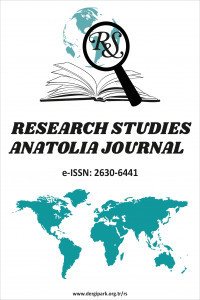BRUNO ETİENNE’İN DÜŞÜNCESİNDE BATI VE MÜSLÜMAN TOPLUMLAR
Bruno Etienne, Müslüman Toplumlar, Din Sosyolojisi, Fransa İslamı
West And Muslim Societies in the Thought of Bruno Etienne
___
- Arabacı, F. (1999). “Din Sosyolojisi Çalışmaları üzerine Bazı Düşünceler Fransa ve Türkiye Örneği”, Dini Araştırmalar, 1 (3): 113-142.
- Baduel, P. (1987). “Bruno Etienne, l’Islamisme Radical”, Revue de l’Occident Musulman et de la Méditerranée, (44): 150-151.
- Drai, R. (2000). “La Grenade Entrouverte de Bruno Etienne”, Revue Française de Science Politique, 50 (3): 538-542.
- Etienne, B. (2007). “Emergence de la Région”, La Pensée de Midi, 21 (2):6-14.
- Etienne, B. (2002). “Fondements du Politique en Méditerranée”, La Pensée de Midi, 7 (1): 51-63.
- Etienne, B. (2005). Heureux comme Dieu en France la République face aux Religions, Editions Bayard, Paris.
- Etienne, B. (2006). “Islam et Liberté: une Salutaire Complexité”, La Pensée de Midi, 19 (3): 68-79.
- Etienne, B. (2003). Islam les Questions qui Fâchent, Bayard, Paris.
- Etienne, B. (1987). L’Islamisme Radical, Hachette, Paris.
- Etienne, B. (2000). “Une Grendade Entrouverte”, La Pensée de Midi, 1 (1): 114-119.
- Fabre, T. (2009). “Bruno Etienne. Sur le Chemin de la Pensée de Midi”, La Pensée de Midi, (4): 11-22.
- Fındıkoğlu, Z. F. (1947). İçtimaiyat, İ.Ü.H.F. Yayını, İstanbul.
- Fregosi, F. (2009). Bruno Etienne: le Fait Religieux Comme Fait Politique, Eds de l’Aube, Avignon.
- Khattar, A. (1989). “Bruno Etienne. La France et l’Islam”, Politique Etrangere, 54 (4): 807-808.
- Mabilon-Bonfils, B. (2010). “Bruno Etienne, Comme Palimpseste ou Comment Lire la Pensée d’un Intellectuel, Comme Mise en Abîme?”, La Pensée de Midi, (Özel Sayı): 10-14.
- Tapia, S. (1994). “Bruno Etienne. L’Islam en France”, CNRS, (17): 323-328.
- Wallez, P. (30 Eylül 2008). “La Religion est Devenue un Supermarché et Pourquoi Pas?”, Accueil.
- Yayın Aralığı: Yılda 4 Sayı
- Başlangıç: 2018
- Yayıncı: Arif YILDIZ
Özge EREN, Ceki Murat MİZRAHİTOKATLI
CAMERON-QUINN ÖRGÜT KÜLTÜRÜ TİPLERİ İLE YENİLİKÇİLİK ARASINDAKİ İLİŞKİNİN İNCELENMESİ
Esra KAYIŞ, Murat GÜRKAN GÜLCAN
BRUNO ETİENNE’İN DÜŞÜNCESİNDE BATI VE MÜSLÜMAN TOPLUMLAR
GARANTİ MARKALARINDAN DOĞAN SORUMLULUĞUN SİGORTALANMASI
EKONOMİK KRİZ DÖNEMLERİNDE TAM ZAMANINDA ÜRETİM (JUST IN TIME) SİSTEMİNİN UYGULANMASI
Arif Selim EREN, Ali Haluk PINAR, Mesut BİLGİNER
TÜRKİYE’DE YOKSULLUKLA MÜCADELE POLİTİKALARININ HUKUKİ ÇERÇEVESİ
